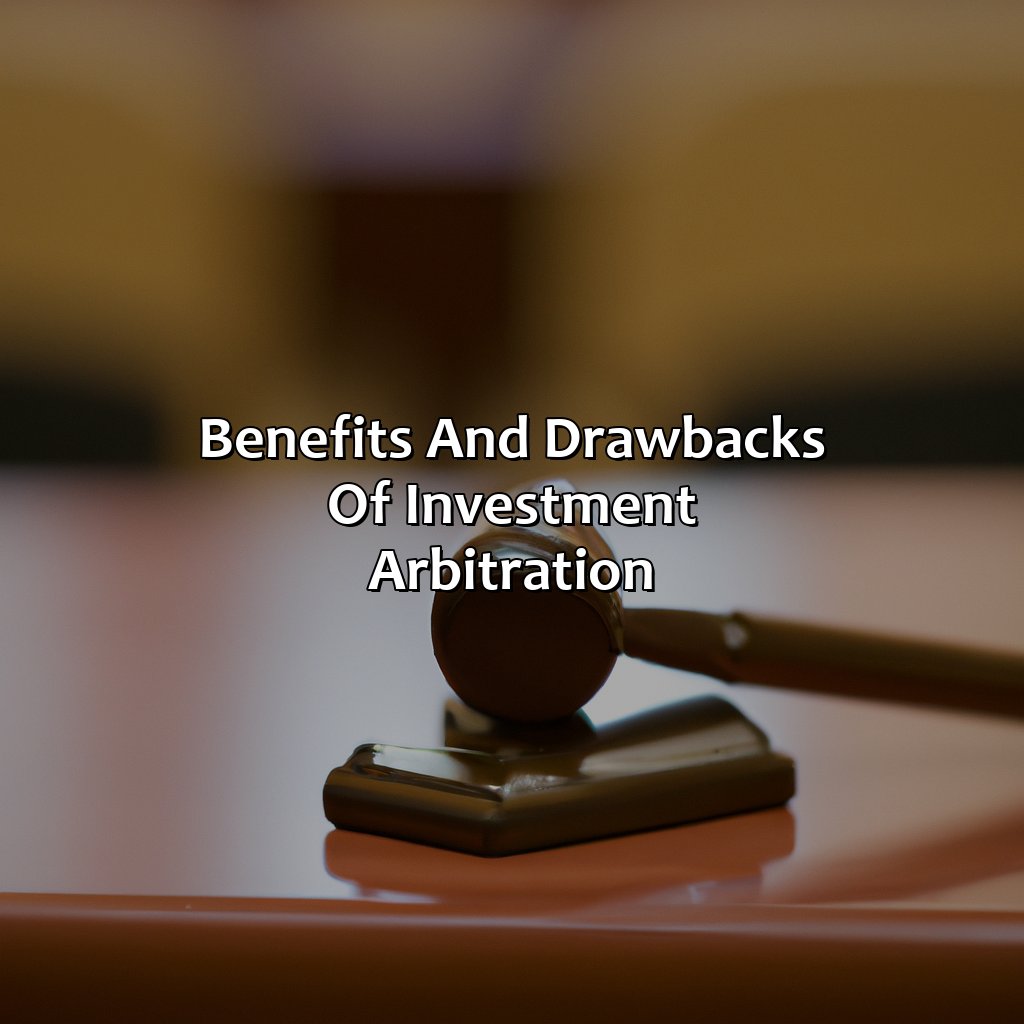What Is Investment Arbitration?
Key Takeaway:
- Investment arbitration is a form of dispute resolution that involves resolving disputes between investors and states or between states themselves. It is an increasingly popular choice for resolving disputes arising out of investments in foreign countries.
- Investment arbitration is designed to provide investors with a level of protection against the risk of expropriation or other forms of government interference that may negatively impact their investments. It provides investors with access to an impartial tribunal that can make binding decisions regarding their investment rights.
- The benefits of investment arbitration include greater investment protection, increased foreign investment, and a more predictable legal environment for investors. However, there are also drawbacks, including the cost and time associated with proceedings and the potential for inconsistent decisions by arbitral tribunals.
Are you confused about what investment arbitration is and how it affects you? Don’t worry, this blog will provide you with a clear understanding of the process, its advantages and potential risks. Learn how international arbitration helps protect investors’ rights and provide a fair resolution to disputes.
What is Investment Arbitration?
Understand investment arbitration? Get the basics! We’ll discuss the definition and how it works. Discover how it settles disputes. Break it down into two sub-sections: Definition of Investment Arbitration and How Investment Arbitration Works. That way, you’ll get a clear perspective.

Image credits: retiregenz.com by Harry Jones
Definition of Investment Arbitration
Investment arbitration refers to the process of resolving disputes between an investor and a state or another party through an arbitration tribunal, rather than domestic courts. Investment arbitration is governed by international treaties, such as bilateral investment treaties or free trade agreements. The arbitrators decide on disputes related to investments made by investors in foreign countries.
In contrast to commercial arbitration, investment arbitration involves disputes concerning political risk and regulatory measures that affect foreign investors. This includes issues related to expropriation, discrimination against foreign investors, breach of contract and unfair treatment.
Investment arbitration has emerged as a popular method for resolving disputes between investors and host states as it provides an impartial venue with experienced arbitrators who uphold procedural rules whilst maintaining fairness in decision-making.
Investors interested in investing abroad should be aware of the risks involved with investing in countries with significant differences from their own. Thus, knowing about investment arbitration and the options available for dispute resolution can help prevent substantial financial losses.
Why fight in a traditional courtroom when you can settle your investment disputes in this high-stakes game of legal arbitrage?
How Investment Arbitration Works
Investment Arbitration is a process that resolves disputes between investors and states. This includes disagreements about investment contracts, regulations, and other laws. Parties use arbitration to avoid the often lengthy and uncertain legal process of national courts.
Parties in Investment Arbitration are typically the investor and the state or its entity (company, agency). Unlike commercial arbitration, which assumes equal bargaining power of parties, investment arbitration presumes an imbalance exists. The Investor-State Dispute Settlement process was created as a balanced solution.
Investment Arbitration allows for neutral international tribunals to hear cases instead of local courts. The arbitrators are usually appointed by both parties or may be selected from lists provided by institutions such as International Chamber of Commerce (ICC), United Nations Commission on International Trade Laws (UNCITRAL) or International Centre for Settlement of Investment Disputes (ICSID).
While there are many reasons for filing an Investment Arbitration case, one particular notable reason is when a state changes policies mid-stream after an agreement has been reached with investors. This can cause significant loss to investors and leaves them with no other suitable legal options other than Investment Arbitration.
In 2012, Uruguay was sued for USD $1 billion over legislating against tobacco sales. Its legislation required cigarette companies to display deterrent images on packaging and prohibited the sale of certain types of cigarettes within view in stores among others. Although it managed to reach favor with locals who saw improvements in health across time; it caused dispute from two affiliate ventures of Philip Morris – Philip Morris Brand Sarl, Switzerland; and Abal Hermanos SA, Uruguay .
When it comes to investment arbitration, it’s not just a game of Monopoly between two players – there are some serious parties involved.
Parties Involved in Investment Arbitration
Gain a clearer perspective on how parties in investor-state and state-state disputes manage their issues. Learn more about investment arbitration to understand the different parties involved. Navigate disputes and resolve concerns with ease.

Image credits: retiregenz.com by James Woodhock
Investor- State Disputes
When investors face disputes with states, they can turn to investment arbitration for resolution. This legal mechanism allows investors to settle claims against states for expropriation, breach of contract, and discrimination.
Investor-state dispute settlement (ISDS) is a popular tool for private parties that wish to hold governments accountable for treaty breaches explicitly or implicitly agreed upon by them or governments. It involves submitting a claim by the investor to an Arbitral Tribunal which will determine if there is a breach in an agreement involving two consenting sides. The process closely examines operations relating to public administration such as health, resources, finance and commerce.
ISDS tribunals are often inaccessible and can prioritize investor interests over human rights and environmental protections. Critics allege that these arbitrations limit democratic decision-making and undermine national sovereignty.
Recently, Vattenfall brought Germany before an ISDS as it concluded its efforts to phase out coal-fired power plants threatened their investments under treaty agreements.
State-State disputes: when countries can’t agree on anything, not even how to spell arbitration.
State-State Disputes
Investment Arbitration also involves disputes between States, which is termed as differences. These dissimilarities arise mainly around contract breaches concerning international trade rules and regulations. The disputes, in this case, are subject to investment treaties or multilateral agreements signed by the states involved, and may have an adverse effect on their respective economies and foreign investments.
State-State Disputes are among the most challenging arbitrations as they require a lot of professionalism since the actors at play represent entire nations, not individual parties such as multinationals or investors. These disagreements involve complex issues that may lead to diplomatic tension between countries if not handled correctly. As such, State-State arbitration procedures are conducted with utmost discretion and confidentiality.
One notable State-State dispute was India vs. Pakistan in 2016 when India filed a petition seeking reimbursement from Pakistan for its seizure of a fishing trawler illegally being used in Pakistan’s waters but owned by Indian nationals. The International Court of Justice ruled that Pakistan breached the VCCR (Vienna Convention on Consular Relations) by not providing counseling rights to India regarding two of its citizens captured after Jadhav had been detained under a charge of espionage.
Overall, State-State disputes require formal and professional management due to their breadth and impact on national governments’ ties and overall relationships.
Like any party, investment arbitration has its benefits and drawbacks, but at least with this one, you don’t have to worry about the embarrassing uncle getting drunk and causing a scene.
Benefits and Drawbacks of Investment Arbitration
Weigh pros and cons of investment arbitration.
Pros:
- Safeguard investor rights.
- Impartial resolution process.
Cons:
- High costs.
- Potential to affect national sovereignty.
Understand implications by exploring both sub-sections.

Image credits: retiregenz.com by Adam Arnold
Benefits of Investment Arbitration
Investment arbitration proves to be an advantageous dispute resolution mechanism for investors and states. The following benefits are noteworthy:
- Enforceability – Investment arbitration awards are binding and enforceable in over 150 countries through the New York Convention.
- Expert Tribunal – Arbitrators have expertise in areas such as international law, economics, and finance, enabling them to accurately assess disputes.
- Confidentiality – Unlike traditional courts, investment arbitration proceedings are kept confidential to protect sensitive information from being disclosed.
- Speed – Disputes can be resolved quicker than traditional court proceedings due to less procedural requirements and greater control over the process by parties involved.
Most importantly, Investment arbitration has been successful in increasing Foreign Direct Investments (FDIs). This mechanism has offered investor protection by enforcing minimum standards of treatment from host states under various investment treaties/ agreements.
Pro Tip: Prior research before investing can decrease chances of encountering disputes that may require investment arbitration.
Looks like investment arbitration is just a fancy word for ‘spend money to sue someone‘, with a side of ‘hope for the best‘.
Drawbacks of Investment Arbitration
Investment Arbitration Pitfalls
- Expensive and lengthy legal proceedings
- Limited or no possibility for appeals
- No uniformity in the interpretation of investment treaties by arbitral tribunals
- Lack of transparency in the decision-making process and the confidentiality of disclosed information
- Possible conflict of interest of arbitrators and disclosure issues
- Perceived bias against developing countries
Despite its prevalence, Investment Arbitration has some significant drawbacks. The high expense and prolonged duration associated with such proceedings may be burdensome for businesses. Additionally, limited opportunities for appeal make it challenging to overturn unfavorable decisions. Furthermore, arbitrators’ dedication to interpreting investment treaties without any standardized compliance may create cross-jurisdictional legal disputes between states. Confidentiality requirements in arbitration further exacerbate these concerns, from a lack of transparency to difficulties for stakeholders. Moreover, minimal regulation on conflicts of interest fuels speculation about prima facie partiality between judges and litigants.
In today’s complex business environment, International investment disputes can lead to battles that undermine trust in settlement procedures. In recent times, one such dispute gave rise to enormous pressure on mining companies operating in Africa that expanded into litigation across the globe hurting their image and triggering massive divestments.
Five Facts About Investment Arbitration:
- ✅ Investment arbitration is a form of international dispute settlement that involves resolving disputes between foreign investors and host countries. (Source: Herbert Smith Freehills)
- ✅ Investment arbitration is based on international treaties and typically involves a neutral panel of arbitrators. (Source: International Chamber of Commerce)
- ✅ Investment arbitration can address a wide range of disputes, including expropriation, breach of investment agreements, and discrimination against foreign investors. (Source: Freshfields Bruckhaus Deringer)
- ✅ Investment arbitration can be a costly and lengthy process, with some cases lasting several years and costing millions of dollars in legal fees. (Source: Lexology)
- ✅ Investment arbitration decisions are generally binding and can only be challenged in limited circumstances. (Source: Allen & Overy)
FAQs about What Is Investment Arbitration?
What is investment arbitration?
Investment arbitration is a process by which disputes between investors and states, or between two countries regarding investment, are resolved by an impartial tribunal.
What types of disputes are covered by investment arbitration?
Investment arbitration typically covers disputes between foreign investors and states, such as expropriation of property, unfair treatment, and breach of investment commitments.
What are the advantages of investment arbitration?
Investment arbitration offers a neutral and impartial process for resolving investment disputes. It is also confidential and provides a final and binding decision.
How does investment arbitration differ from traditional court proceedings?
Investment arbitration differs from traditional court proceedings in that it is a private, not public, process. It is also presided over by a tribunal of arbitrators rather than a judge or jury.
Who can use investment arbitration?
Investment arbitration is generally open to foreign investors and states or two countries in their disputes involving investments. However, the specific rules governing eligibility may vary by arbitration agreement.
What is the role of the arbitral tribunal in investment arbitration?
The arbitral tribunal serves as an impartial decision-making body in investment arbitration. It is typically composed of three arbitrators, who are selected by the parties involved or an appointing authority if the parties cannot agree on the arbitrators. The tribunal hears arguments and evidence from both sides and issues a final and binding decision.
